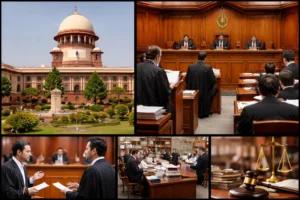The Supreme Court of India recently overturned the expulsion of RJD MLC Sunil Kumar Singh from the Bihar Legislative Council, emphasizing that the punishment imposed on a legislator must be proportionate to the alleged misconduct. The Court stressed that an excessively harsh penalty not only violates democratic principles but also deprives the electorate of representation in the House.
"Imposing a disproportionate punishment not only undermines democratic values by depriving the member from participating in the proceedings of the House but also affects the electorates of the constituency who remain unrepresented,"
observed the bench comprising Justice Surya Kant and Justice NK Singh.
The Court underscored that removing an elected representative has far-reaching consequences for both the member and their constituents. If a punishment appears excessively harsh and disproportionate, Constitutional Courts have a duty to intervene and ensure fairness.
Read Also:- Can a Special NIA Court Designated as an MP/MLA Court Hear Cases Against Other Accused?
Case Background
The case arose from allegations that Sunil Kumar Singh had used derogatory remarks against Bihar Chief Minister Nitish Kumar during a session of the Bihar Legislative Council. Following an Ethics Committee inquiry, Singh was expelled, while another legislator involved in similar misconduct was merely suspended for two days. Singh challenged his expulsion, arguing that it was illegal, unconstitutional, and violated the principles of natural justice.
The Court rejected the argument that Article 212(1) of the Constitution bars judicial scrutiny of legislative actions. While acknowledging that procedural irregularities in legislative proceedings are generally beyond judicial review, the Court clarified that when a legislative action infringes upon fundamental rights or is arbitrary and disproportionate, it can be subjected to judicial scrutiny.
"Judicial review of Legislative Decisions is not an encroachment upon legislative dominion but a necessary safeguard to uphold constitutional supremacy," the judgment stated.
The Supreme Court outlined guiding principles for courts to consider when evaluating the proportionality of legislative punishments. While these factors may vary from case to case, the indicative list includes:
- Degree of obstruction: How much the member's actions hindered legislative proceedings.
- Impact on House dignity: Whether the behavior brought disrepute to the legislative body.
- Past conduct: The erring member’s prior record.
- Remorse and cooperation: Whether the member has shown regret or cooperated with the inquiry.
- Availability of lesser penalties: Whether milder disciplinary measures could have sufficed.
- Nature of remarks: Whether offensive statements were deliberate or influenced by local dialect.
- Societal and electoral balance: Weighing the interests of the public against the need for legislative discipline.
The Court found that Singh’s expulsion was excessive and disproportionate, violating his fundamental rights under Articles 14 and 21 of the Constitution. It held that a lesser punishment, such as suspension, would have sufficed to address his misconduct.
"The expulsion of the petitioner is disproportionate and pricks the conscience of this Court, compelling it to intervene on the sheet anchor of justice and fairness," the judgment declared.
Supreme Court's Directive
In light of its findings, the Supreme Court ruled that:
- The period of expulsion already undergone by Singh should be considered as a suspension period, which is sufficient punishment.
- The Bihar Legislative Council must reinstate Singh as an MLC immediately.
- The Election Commission's notification for a by-election to fill Singh’s seat was quashed.
- Singh will not receive remuneration for the period of his disbandment but will be entitled to post-tenure benefits.
The Court also warned that if Singh engages in further misconduct, the Bihar Legislative Council may take appropriate action against him.















